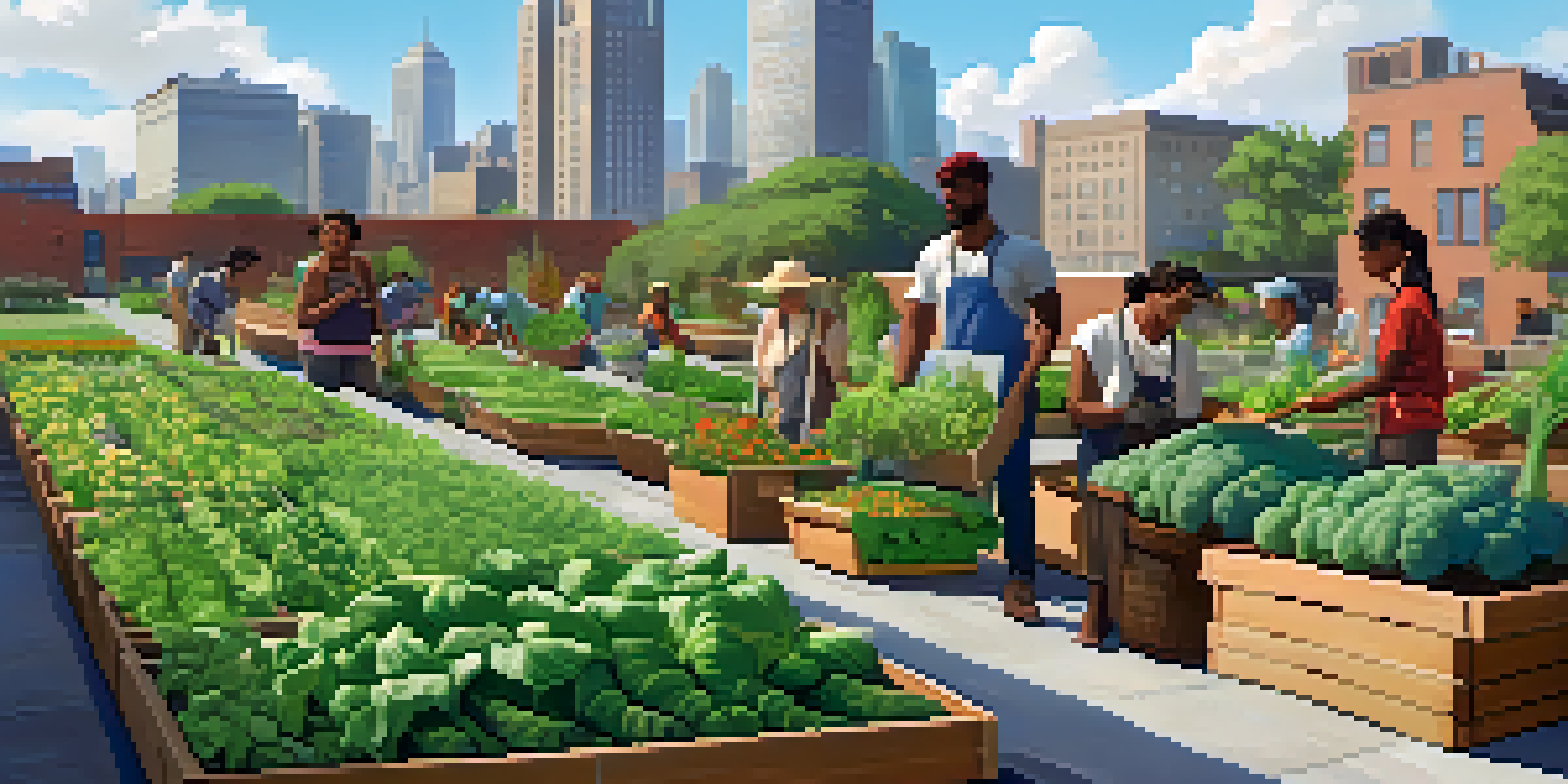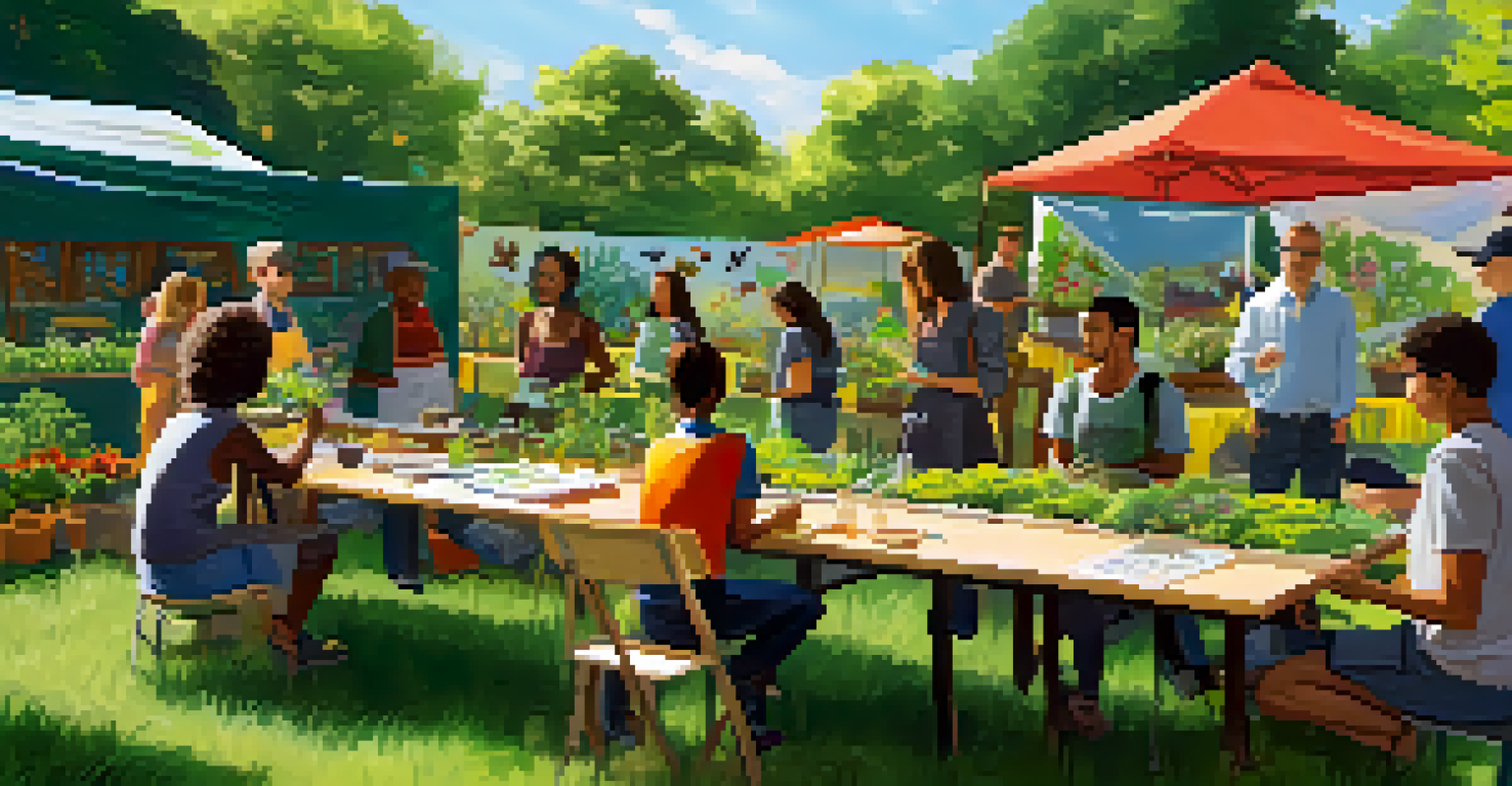Marijuana and Urban Farming: A Community Development Tool

Understanding Urban Farming and Its Benefits
Urban farming refers to the practice of cultivating, processing, and distributing food in and around urban areas. It transforms vacant lots and rooftops into vibrant green spaces that can provide fresh produce to local communities. This practice not only enhances food security but also fosters community connections as residents come together to cultivate their own food.
Urban agriculture can help create a more sustainable food system and improve quality of life in cities.
The benefits of urban farming extend beyond just food production. It contributes to environmental sustainability by reducing carbon footprints and improving air quality. Additionally, urban farms can create job opportunities and stimulate local economies, making them essential for the growth of urban communities.
By integrating urban farming with sustainable practices, cities can promote healthier lifestyles and stronger community ties. These initiatives encourage collaboration among residents, local governments, and organizations, which can lead to a more resilient urban ecosystem.
The Role of Marijuana in Urban Farming
Marijuana, or cannabis, has emerged as a unique crop within the urban farming movement. Its cultivation not only meets increasing demand but also offers financial benefits to urban farmers. By diversifying their crops to include marijuana, farmers can tap into a lucrative market, enhancing their economic viability.

Beyond economics, marijuana plants can contribute to community development by providing educational opportunities. Urban farms that grow cannabis can serve as platforms for workshops and training sessions on sustainable agriculture practices, helping to demystify the plant and educate the public about its benefits and uses.
Urban Farming Boosts Community Ties
Urban farming not only enhances food security but also fosters community connections by bringing residents together to cultivate their own food.
Moreover, the cultivation of marijuana can help break down stigmas associated with the plant. As urban farms grow marijuana alongside other crops, they create spaces for open discussions and understanding, promoting responsible use and awareness within the community.
Community Engagement Through Urban Farming
Urban farming initiatives that include marijuana cultivation can serve as catalysts for community engagement. By involving local residents in the farming process, these projects foster a sense of ownership and pride. When people actively participate in their food production, they are more likely to invest in their community's wellbeing.
The future will not be about the urban farmers and gardeners growing food in isolation, but rather about how they can work together to create a more vibrant community.
Engagement initiatives can take many forms, such as volunteer days, educational programs, and community events centered around harvests. These activities not only build relationships among residents but also create a stronger support network, which is crucial for any community's resilience.
Additionally, when community members come together to work on urban farms, they often share their knowledge and skills. This exchange of ideas can lead to innovative solutions for local challenges, further enhancing the community's capacity to thrive.
Economic Impact of Marijuana in Urban Farming
The economic potential of incorporating marijuana into urban farming cannot be underestimated. The cannabis industry has seen exponential growth, providing urban farmers with significant financial incentives. By growing marijuana, farmers can increase their income and reinvest in their communities, creating a cycle of economic improvement.
Moreover, cannabis cultivation can lead to job creation within urban areas. From cultivation to distribution, numerous opportunities arise, helping to alleviate unemployment in struggling neighborhoods. As urban farms expand their operations, they can provide training and job placements, further benefiting the local economy.
Cannabis Cultivation Drives Economy
Incorporating marijuana into urban farming can significantly enhance economic viability, create jobs, and increase income for local farmers.
Additionally, the taxes collected from legal cannabis sales can be funneled back into community development projects. This reinvestment can fund essential services, such as education and public health, ultimately improving the quality of life for all residents.
Environmental Benefits of Cannabis Cultivation
Urban farming, including the cultivation of marijuana, can lead to various environmental benefits. By growing plants in urban areas, we can combat the heat island effect, improve air quality, and promote biodiversity. Cannabis plants, in particular, can be grown using sustainable practices that contribute to healthier ecosystems.
Furthermore, integrating marijuana cultivation into urban farming can enhance soil health. Through responsible cultivation techniques, like crop rotation and organic practices, urban farmers can enrich the soil, leading to long-term agricultural sustainability. Healthier soil results in better yields for all crops grown in urban farms.
Lastly, urban farms that grow marijuana can serve as educational platforms for environmental awareness. By showcasing sustainable practices, these farms can inspire a new generation of environmentally conscious citizens who prioritize ecological stewardship in their communities.
Addressing Legal and Social Challenges
While the potential benefits of growing marijuana in urban farms are numerous, there are legal and social challenges to consider. Regulations surrounding cannabis cultivation vary widely, and urban farmers must navigate these laws to operate legally. This can be a significant barrier for those looking to incorporate marijuana into their farming practices.
Moreover, social stigma surrounding marijuana still exists, which can hinder community acceptance of these initiatives. Education plays a vital role in overcoming these barriers, as informed community members are more likely to support local cannabis cultivation efforts. Open dialogue and transparency can help alleviate concerns and foster a more accepting environment.
Sustainable Practices Improve Environment
Urban farms that grow cannabis can contribute to environmental sustainability by promoting biodiversity and improving soil health through responsible cultivation techniques.
Working together with local authorities and advocacy groups can help urban farmers address these challenges. By forming coalitions, they can push for policy changes that support cannabis cultivation, ultimately benefiting the entire community.
Future of Urban Farming and Cannabis Cultivation
The future of urban farming, particularly with the integration of cannabis cultivation, holds immense promise. As cities continue to grow and face challenges related to food security and environmental sustainability, urban farms can provide innovative solutions. By embracing cannabis as a viable crop, urban farmers can enhance their resilience and adaptability in changing landscapes.
With increasing public interest in sustainable practices and local food systems, the demand for urban farms is likely to grow. This presents an opportunity for cannabis cultivation to become a cornerstone of urban agriculture, driving community development and economic growth. As more cities recognize the value of urban farms, we may see a shift in policies that support these initiatives.

Ultimately, the collaboration between urban farmers, local governments, and community members will shape the future of urban farming. By working together, they can create thriving, inclusive spaces that utilize cannabis as a tool for community development and empowerment.